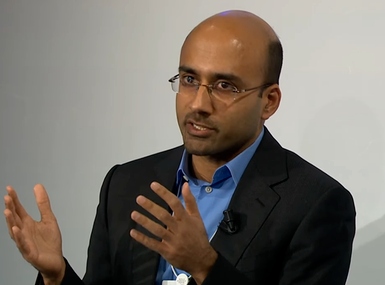Princeton University economist and a member of the minority Ahmadi community Atif Mian resigned from Pakistan’s newly-constituted Economic Advisory Council (EAC) on Friday, after the Imran Khan government requested him to step down. Senator Faisal Javed Khan tweeted that a replacement for Mian will be announced in the coming days.
Atif Mian was asked to step down from the Advisory Council and he has agreed. A replacement would be announced later.
— Faisal Javed Khan (@FaisalJavedKhan) September 7, 2018
Taking to Twitter, Mian said that he resigned from the EAC since the Pakistan Tehreek-e-Insaaf government was “facing a lot of adverse pressure regarding my appointment from the Mullahs (Muslim clerics) and their supporters.”
2/ Nevertheless, I will always be ready to serve Pakistan as it is the country in which I was raised and which I love a great deal. Serving my country is an inherent part of my faith and will always be my heartfelt desire.
— Atif Mian (@AtifRMian) September 7, 2018
4/ My prayers will always be with Pakistan and I will always be ready to help it in any way that is required.
— Atif Mian (@AtifRMian) September 7, 2018
Ahmadis are designated non-Muslims in Pakistan’s Constitution and their beliefs are considered blasphemous in most mainstream Islamic schools of thought. They are often targeted by the extremists and their places of worship vandalised. Mian, a Massachusetts Institute of Technology-educated Pakistani-American economics professor, was recently named member of the 18-member EAC to advise the government on economic policy. He is the only Pakistani to be considered among International Monetary Fund’s list of ‘Top 25 brightest young economists’. Early on Friday, Minister of Information Fawad Chaudhary announced the Pakistan government’s decision to withdraw Mian’s nomination. “The government wants to move forward alongside scholars and all social groups, and it is inappropriate if a single nomination creates a contrary impression,” he tweeted.
Impact Shorts
More ShortsChaudhary went on to say that the ideal state, according to Prime Minister Imran Khan, is of Madina, whereas the premier and his cabinet members love the Prophet Muhammad dearly. “Khatm-i-Nabuwwat is a part of our faith and the recent success achieved by the government over the matter of blasphemous sketches also expresses the same sentiment,” he wrote.
The move comes days after the PTI defended Mian’s nomination, saying that it will not bow to extremists. “Pakistan belongs as much to minorities as it does to the majority,” Chaudhary was quoted as saying by Dawn newspaper, amidst a vicious online campaign targeting Mian for his Ahmadiyya faith. The PTI has received heavy backlash on Twitter for succumbing to mounting pressure from politicians and the religious right:
Is there no resistance that can save Pakistan from bigots & hate-mongers? Are we doomed to watch Aamir Liaquats, Orya Maqbools, Khadim Rizvis and Ehsanullah Ehsaans become the face of our country?
— Mahwash Ajaz 🇵🇰 (@mahwashajaz_) September 7, 2018
How do people like Malala & Atif Mian survive? Where do they go?
"Atif Mian asked to step down."
— Fifi Haroon (@fifiharoon) September 7, 2018
Unfortunately the naya Pakistan govt didn't have the guts to see this through.
Quaid e Azam did when he appointed Chaudhry Sir Muhammad Zafarullah Khan 1st Minister of Foreign Affairs for Pakistan
There are some things purana Pakistan did better. pic.twitter.com/nhCyA54l8L
Mian was roped in to be part of the EAC by Prime Minister Imran Khan, to provide the best possible professional advice to his cash-strapped government on prudent economic policies. Out of the EAC’s 18 members, seven belong to government and 11 are from the private sector. The council is expected to play a pivotal role in strengthening the government’s capacity to design and introduce sound and effective policies for rapid and continued social and economic advancement, human resource development, improvement of business processes, and strengthening of data services. Khan asked the council to give its recommendations in two weeks for possible steps to be taken for the expedient return of unlawfully acquired assets from abroad. With inputs from PTI


)

)
)
)
)
)
)
)
)



